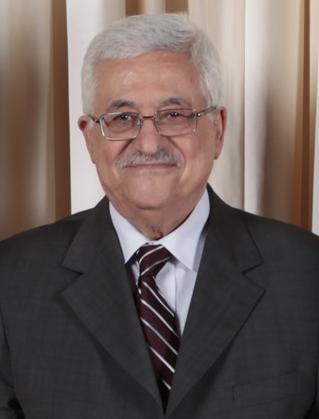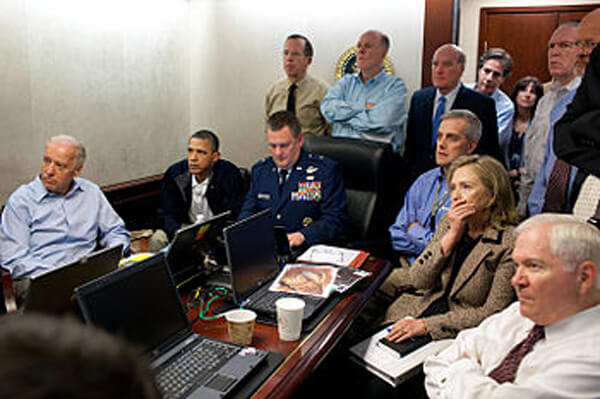A new survey of Palestinians reflects support of two-states, backing for Abbas over Haniyeh in presidential race, and reflect continued admiration for the late President Yasir Arafat
By Ray Hanania
A majority of Palestinians said that despite the increased brutality from Israel and the Israeli war on the Gaza Strip that took more than 2,000

civilian lives, they still support the Two-State solution by a strong margin of 54 percent.
The poll by Dr. Nabil Kukali and the Palestinian Center for Public Opinion conducted in the last two weeks of October, sampled 1,000 Palestinians living in the West Bank, Gaza Strip and Arab East Jerusalem.
The wide ranging poll also surveyed Palestinians on their feelings about the upcoming Palestinian elections and fears that a 3rd Intifada would explode soon as a result of continued Israeli brutality. More than 74 percent of respondents said they “missed” the late President Yasir Arafat, who was a hero who forced the world to recognize the plight of the Palestinians and Palestinian claims on lands occupied by Israel in 1948 and again in 1967.
And, according to the poll, a majority of Palestinians, almost 60 percent, support the change int he government of Egypt and the role Egypt is playing with respect to the “Palestinian cause.”
In a one-on-one election contest, 35.8 percent of Palestinians said they would vote to re-elect Mahmoud Abbas as Palestinian Presidents while only 28.3 percent said they would support Hamas leader Ibrahim Haniyeh. In the event that Abbas declines to run for office, Palestinians offered support for a wide range of potential successors with Haniyeh receiving 17 percent of voter support, but not enough to defeat the number one candidate preferred by Palestinians, imprisoned Palestinian activist Marwan Barghouti who received nearly 20 percent of the vote. Palestinian activist Mustafa Barghouti only received 2.4 percent of the vote. More than 17 percent said that they would boycott any elections.
Here is the complete details of the new survey report from Dr. Kukali and the PCPO:
Poll No. 194
November 6, 2014
Dr. Kukali: Escalation of security in East Jerusalem accelerates the ignition of new violent confrontations with Israel.
The Key results of this poll are:
- (35.8%) of the Palestinian public would vote for Mahmoud Abbas if he would be a candidate for the presidential elections for Fatah, whilst (28.3%) would vote for Ismael Haniyyeh.
- (54.3%) of the Palestinian public support the two-state solution.
- (42.3%) support returning to the table of the peace negotiations between the Palestinians and the Israelis.
- (50.0%) anticipate a violent confrontation with Israel as a result of the escalating security deterioration in East Jerusalem.
- (60.2%) are in favor of the Arab and Muslim visits to Jerusalem.
- (74.1%) still miss the late President Yassir Arafat.
- (59.6%) evaluate the Egyptian role in the Palestinian cause as positive.
- (89.3%) believe that the resolution of the Swedish government recognizing the State of Palestine is a significant step.
Beit Sahour – Section of Public Relations:

The latest poll prepared by Dr. Nabil Kukali and conducted by the Palestinian Center for Public Opinion (www.pcpo.org), during the period from 15 – 28 October, 2014 covered a random sample of (1000) Palestinian respondents representing the various demographic specimens of Palestinians (18 years and above) living in the West Bank, including East Jerusalem, and Gaza Strip. It revealed that (35.8%) of the Palestinians would vote for Mahmoud Abbas (Abu Mazen) if he would run for the next term of the PA-Presidency against (28.3 %) for Ismael Haniyyeh.
Dr. Nabil Kukali, President and founder of the Palestinian Center for Public Opinion, said in a statement that the majority of the Palestinian public are content with the performance of the PA-President Mahmoud Abbas. Furthermore, Dr. Kukali stated that (60%) of the Palestinian public believe that the visits of Arabs and Muslims to East Jerusalem is a moral and economic support for them and might raise the morale of the Palestinians in general and the Jerusalemites in particular and back them. In addition, such visits would support the economic process in the scope of the religious tourism.
Dr. N. Kukali added that three out of four Palestinians still miss the late president Yassir Arafat. “We hope that the tenth anniversary of his departure”, Dr. Kukali said “would be a new beginning for enforcing the principle of reconciliation and exerting genuine efforts with a national will and assume true responsibility for giving priority to the national interests, cooperation and dialogue within a democratic framework and boost national unity on the ground of partnership and pluralism.
Dr. N. Kukali further pointed out that (89.3%) of the Palestinian public believe that the resolution of the Swedish government dated 3rd of Oct. 2014 recognizing the State of Palestine would boost the elements of peace and security in the region and encourage other European countries to follow the Swedish resolve and recognize the Palestinian state.
Dr. Kukali further said that a considerable rate among the Palestinians are in favor of returning to the table of the peace negotiations between the Palestinians and the Israelis and referred to the potential leverage of the international community when assuming its humanitarian, moral and legal responsibilities by providing the warranties for a successful resumption of the peace negotiations between the Palestinians and Israel as a matter of implementing the relevant UNSC resolutions and the terms of the Arab Peace Initiative.
Dr. Kukali concluded his statement warning that half of the Palestinian public anticipate a new violent confrontation with Israel as a result of the escalating security deterioration in East Jerusalem in general and in the area of the holy al-Aqsa Mosque in particular, the matter which would blow up any perspective of a peaceful settlement for the Palestinian-Israeli conflict on the basis of the two-state solution and would push the whole area to a new conflagration, in particular as (54%) of the Palestinians support the two-state solution as a compromise to the Israeli-Palestinian conflict .
Hereunder are the key results in details:
Departure of the leader Yassir Arafat:
Responding to the question: “ Do you still miss the late President Yassir Arafat 10 years after his departure ?”, (44.4%) said “Yes, very much”, (29.7%) “Yes, somehow”, (17.5%) “not so much”, (3.2%) “No, at all” and (5.2%) said “I don’t know”.
Visit of Arabs and Muslims to Jerusalem:
(60.2%) of the Palestinian public consider the visits of Arabs and Muslims to the occupied East Jerusalem and to al-Aqsa Mosque as support and raising morale of the Jerusalemites and the Palestinians in general, whilst (22.5%) said this would mean “normalization with the Zionist entity” and (17.3%) declined to answer the relevant question.
A violent confrontation with Israel:
Regarding the question:”In the light of the present, daily clashes in East Jerusalem, do you expect in the near future a new violent confrontation with Israel ?”, (50%) said “Yes”, (28%) “No” and (22%) said “I don’t know”.
The PA-Presidential elections:
(35.8%) of the Palestinian public would vote for Mahmoud Abbas if he would be a candidate for the presidential elections for Fatah, whilst (28.3%) would vote for Ismael Haniyyeh if he would be nominated by Hamas, (28.1%) said they wouldn’t participate in the coming elections, and (7.8%) declined to answer the relevant question.
Responding to the question:”If the PA-President, Mr. Mahmoud Abbas, would take the decision not to candidate for the upcoming presidential elections, whom from the following Palestinian figures would you recommend to hold the post of the president of the Palestinian National Authority ?”. The answers came as follows:
Ismael Haniyyeh (17.6%), Majed Faraj (2.5%), Salam Fayyad (3.3%), Zuhaira Kamal (0.1%), Khaled Misha’l (5.1%), Marwan Barghouthi (19.7%), Azzam el-Ahmad (1.7%), Mohammad Dahlan (2.8%), Munib al-Masri (0.3%), Mohammad Eshtayyeh (0.1%), Ahmad Sa’adat
(1.1%), Taysir Khaled (0.2%), Ramadan Shallah (1.1%), Mahmoud al-Zahhar (0.6%), Rami al-Hamadallah (12.3%), Bassam el-Salhi (0.1%), Moussa Abu Marzouq (0.1%), Saeb Eriqat (0.9%), Ahmad Qurai (0.6%), Usama el-Qawasmi (0.2%), Mustafa el-Barghouthi (2.4%), Ahmad el-Majdalani (0.1%), Khalil el-Hayyeh (0.2%), would boycott the elections (17.2%) and (9.7%) said “I don’t know”.
Opening separate gates for the Jews:
In regard to the question:”The office of the Palestinian president released a statement saying that ‘opening of separate gates for the Jews to enter the premises of the Holy al-Aqsa Mosque would be considered as a unilateral measure that would torpedo any opportunity for reinstating the peace process. Do you agree to this statement or not ?”, (85.6%) said “Yes, I agree”, (4.1%) “No, I don’t agree” and (10.3%) said “I don’t know”.
Decision on War and peace:
In respect of the question:” The Palestinian president Mahmoud Abbas conditioned on Hamas that going into partnership with them will be subject to placing the arms into the hands of the Palestinian State and that the decision on war and peace must be one. Do you support or oppose this statement ?”, (42.7%) said “I support”, (31.1%) said “I oppose” and (26.2%) said “I don’t know”.
Arms of the Palestinian Resistance:
Responding to the question:”Ismael Haniyyeh, Vice-Chairman of Hamas Movement, said in his Eid al-Adha-sermon in Gaza: ‘No prejudice to and no compromise on the arms of the Palestinian resistance and its means. Do you support or oppose this proclamation ?”(49.6%) said “Yes, I support it”, (24.6%) “No, I don’t support it” and (25.8%) said “I don’t know”.
Performance of President Mahmoud Abbas:
(48.7%) of the Palestinian public are content with the way President Mahmoud Abbas is administering his post as president of the Palestinian National Authority, whilst (38.4%) said they are discontent and (12.9%) said “I don’t know”.
Performance of Hamas:
(40.7%) of the respondents said that they are discontent with Hamas performance after the end of the war, whilst (38.2%) said that they are content and (21.2%) said “I don’t know”.
The Diplomatic Efforts:
(46.6%) of the Palestinians support the diplomatic efforts President Mahmoud Abbas is exerting to end the occupation and establish the Palestinian State, whilst (30.6%) opposed that and
(22.8%) declined to answer the relevant question.
Assuming the responsibility for Gaza:
Responding to the question:”After the first session of the government of the Palestinian national consensus in Gaza on October 9th, 2014, do you think this government will be able to assume its responsibility for Gaza ?”, (52.4%) said “Yes”, (16.7%) said “No” and (30.9%) said “I don’t know.”
And with regard to the supplementary question:” Do you think Hamas is serious in cooperating with the government of the Palestinian national consensus on assuming its responsibility for Gaza?”, (48.5%) said “Yes”, (29.5%) said “No” and (22%) said “I don’t know”.
Donors’ Conference for Gaza Reconstruction:
(46.1%) of the respondents are of the opinion that the Donors’ Conference for Gaza Reconstruction will succeed in ‘mobilizing’ 4 billion US-Dollars over the next three years for Gaza, whilst (26.3%) said “it won’t succeed” and (27.6%) declined to answer the relevant question.
In the same context, the respondents were asked to give their opinion on the following statement:”In a DPA-press release, the Palestinian Minister of Economy, Mr. Mohammad Mustafa, cautioned the donors as to be reserved about financing the reconstruction of Gaza as long as Hamas, who refuses to renounce violence, holds control of the Strip and a specter of another outbreak of fighting with Israel is looming… Do you agree to the statement of this press release or not?”, (30.0%) said “Yes, I agree”, (40.8%) said “No, I don’t agree” and (29.2%) said “I don’t know”.
The Internal Security Forces at present in Gaza Strip:
(55.5%) of the Palestinian public support that 3.000 elements of the internal security at present in Gaza be integrated into the Palestinian internal security forces that are subject to the government of the Palestinian National Unity and be under the command of this latter, while (23.3%) opposed that and (21.2%) refused to respond to the relevant question.
The Swedish government decision:
Responding to the question:”Do you believe that the Swedish government decision recognizing the State of Palestine is an important step for the begin of a recognition process by other European countries?”, (89.3%) said “Yes”, (2.8%) “No” and (7.9%) declined to answer this question.
The Egyptian Role:
With regard to the question:”How would you evaluate at present the Egyptian role in the Palestinian cause ?”, (23.1%) said “extremely positive” (36.5%) “somehow positive”, (20.4%) “somewhat negative”, (15%) as “extremely negative” and (5%) said “I don’t know”.
The Two-state Solution:
Responding to the question:”In principle, do you support or oppose the two-state solution?”, (54.3%) said “I support it”, (31.3%) “I oppose it” and (14.4%) said “I don’t know”.
The future of peace between the Palestinians and the Israelis:
Regarding the question:”Now think of the future when your children become in your age. Do you ever think that there will be peace between the Israelis and the Palestinians ?”, (10.3%) said “certainly”, (32.9%) “likely”, (26.5%) “possible”, (12.5%) “unlikely”, (15.0%) “Never at all” and (2.8%) said “I don’t know”.
Methodology of the Survey Study
Mr. Elias Kukali, Head of the Quantitative Researches Department at the PCPO, said that all interviews of this survey were conducted inside the respondents’ homes, i.e. face-to-face during different working hours, at least 5 hours a day, including the evening time, in order to ensure proper representation of those sub-groups of the population, which would otherwise be difficult to reach and selecting one individual in each household using Last Birthday Method. The choices were taken from a total of (165) election sites, from which (123) sites are located in West Bank and (442) sites in Gaza Strip according to the distribution of the Central Election Commission. These election sites were randomly chosen by using the method of the simple random sample. These in turn were the beginning of the random sample choice made from those regions in accordance with PCPO’s long experienced methodology.
Mr. Elias Kukali has further established that the margin of error was (±3.0%) at a significance and confidence levels of (5.0%) and (95%) respectively. He added that the rate of the female respondents in this survey was (49.2%) against (50.8%) male respondents. The distribution of the random sample between the Palestinian two major regions was (61.5%) in the West Bank, including East Jerusalem, and (38.5%) in Gaza Strip.
About PCPO
The Palestinian Center for Public Opinion (PCPO) is a leading full service research institute in Palestine and in a position to organize, implement, handle and conduct national and regional field surveys, studies and researches of any size within the Middle East and North Africa (MENA). The PCPO is founded in February 1994 in Beit Sahour by Dr. Nabil Kukali, who became the president of this center since that time. After the arrival of the Palestinian Authority (PA), the PCPO was registered as a research center under license number (Am/2). The Palestinian Ministry of information issued the license that permits establishing satellite offices elsewhere in the West Bank and Gaza Strip. Furthermore, PCPO is registered as a licensed business at the Ministry of Treasury under number 989326251. In addition, we are a member of WIN/Gallup International, ANPOP, WAPOR and ESOMAR.
Related articles


- Israelisnipers shooting and killing hospital workers in Gaza - December 11, 2023
- CAIR Condemns Israeli Executions of Wounded, Unarmed Palestinian in West Bank - December 11, 2023
- Arab and Muslim American voters face a “simple choice” between Biden’s inhumanity and Trump’s edgy politics - December 9, 2023























